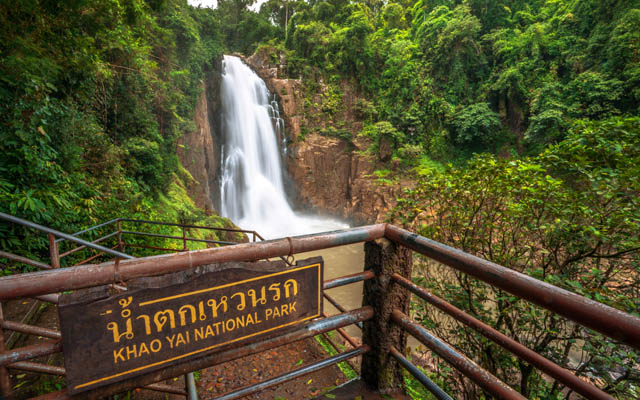
Thailand has fallen from 36th to 47th in the latest Travel and Tourism Development Index recently released by the World Economic Forum (WEF), a major blow to the government which saw the country grow by just 1.5 percent in the first quarter of 2024.
The news has led many in the travel and hospitality industry to call for further financial and conceptual investment in the sector.
 Khao Yai is a relatively new destination for international travelers. Pictured is Haew Narok Waterfall in Khao Yai National Park.
Khao Yai is a relatively new destination for international travelers. Pictured is Haew Narok Waterfall in Khao Yai National Park.
The WEF Index is an analytical overview of a country's travel and tourism industry. It draws conclusions based on sustainability, socio-economic and environmental factors, as well as stakeholder consultation.
The index has five pillars. The first pillar is Business Environment, which looks at how favorable a country's policy environment is for investment and business. The next pillar, Safety and Security, considers safety risks to locals, tourists and businesses. Health and Sanitation looks at medical infrastructure and accessibility to treatment.
The human resources and labour market pillar monitors workforce skill levels, worker health and safety, pay rates and equality in the workplace. The final pillar is ICT readiness, which analyses access to and usability of information and communications technology infrastructure and digital services.
The WEF Index results pose a challenge to the Thai government's tourism policy. Despite government efforts to streamline visa procedures and promote Thailand's travel product, the Index results highlight the need for more substantial improvements.
Sandy Liu, general manager of InterContinental Khao Yai Resort, believes improving infrastructure across the country, especially in lesser known areas, is key.
“The government may need to consider upgrading and expanding transport infrastructure such as airports, roads and public transport to improve access and convenience for tourists. This is particularly important for remote areas like Khao Yai, which is a very beautiful tourist destination and relatively new to international travellers,” Liu pointed out.
“Early completion of new highways and/or the introduction of high-speed rail could significantly improve access to these locations. Additionally, providing investment incentives in tourism infrastructure and services, especially in less developed areas, would also be beneficial.”
For Sukamal Mondal, regional general manager of Onyx Hospitality Group's Amari Bangkok and Shama Properties Bangkok, the index's weak showing is an opportunity for improvement.
“Thailand's drop in the ranking is certainly a concern, but we see this (report) as a call to action to strengthen our collective efforts to improve Thailand's tourism attractiveness. Though it is a setback, it is also an opportunity for stakeholders to work together, innovate and reclaim Thailand's position,” he said.
But Mondal said more money was needed at the ground level to address underlying problems, saying investment in improving transport links and modernising accommodation was “essential”.
Mondal also called for more effective public-private partnerships to resolve ongoing issues. Collaboration between the government and private sector will lead to innovative solutions and promote better utilization of resources. Moreover, a focus on sustainability and safety in tourism will not only attract more tourists but also improve their overall experience. “By working together on these areas, we can work towards improving Thailand's position in global tourism rankings,” he added.
Ann Arrowsmith, general manager of 137 Pillars House Chiang Mai, also suggested looking outside the obvious tourist centres to address the issues raised by the WEF index.
“Regional tourism needs greater attention and a broader strategic approach, especially with regard to increasing and geographically dispersed international flight arrivals. Chiang Mai is a good example, where hotel supply is booming but inbound flights have yet to reach pre-COVID levels. Efforts are needed to attract major airline partners from the Middle East, India and elsewhere.”
Arrowsmith also explained how big international events can raise Thailand's profile: “It's good for a country to secure major sporting events to gain wider support – look at the impact Formula 1 has had in Singapore, or how Saudi Arabia is investing heavily to boost its appeal through golf and tennis events.”



